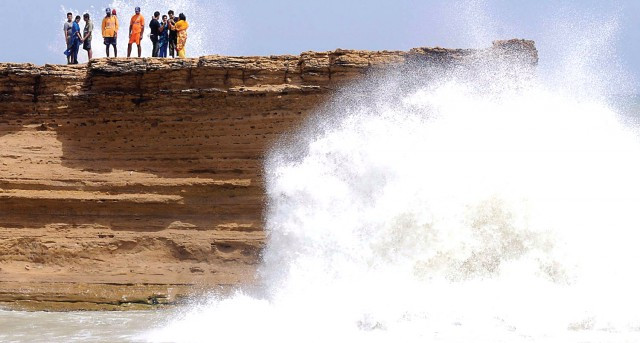Crash in to me
It seems as if the fiercer the waves get the more people are attracted to them, with fatal consequences.

Crash in to me
Come weekend, heat-striken Karachi residents flock to the sandy beaches and prance about in the wild waters of the Arabian Sea.
Seven young people out for picnics on Sunday were swept away by the sea, four of them were rescued safely. Meanwhile, the search continues for the other boys.
The distraught mother of one of the boys who drowned at sea had no words: “Who can we ask for help, nobody can help us, my son is gone,” she sobbed.
Police have attempted to stop people from going in but their half-hearted orders fall on deaf ears. Rescue efforts are frail with hardly any lifeguards appointed by the provincial government to man the beaches.
What’s worse is that the 40 or so lifeguards who were working under a welfare organisation, Pakistan Aquatic Life Saving (PALS), have packed up and left. Their tall, rickety benches, huts and offices stand empty in the season that they are needed the most. “There are too many people coming out here,” complained Nasir, a lifeguard. “If we go out to save somebody, another will be drowning somewhere else.”
Twenty-four-year-old Hisham Ali (not his real name), however, was one of the luckier ones. He went to Sandspit on Saturday morning with a group of friends, oblivious to the ban and just waiting to run into the cold water as soon as he saw it.
He does not really remember how it happened, he was just “swimming in the water with friends” and he closed his eyes to just flow with the waves. The next moment he opens his eyes to rushing water all around him. “I couldn’t touch the ground anymore and I was some 30 to 40 feet away from the shore,” reacalls the six-feet-tall man. “I did not panic at first, I told myself whatever, I’ll just swim.”
But swimming against the strong currents is scarcely an easy, or even possible, feat and when Hisham realised he was not moving any closer to the shore or his frantic friends, panic descended on him. “I’m a pretty good swimmer, I can swim five laps nonstop in a pool but the current was really strong,” he told The Express Tribune. “I thought I was a goner.”
However, Hisham was brave enough not to let the panic overcome his senses and when he realised the swimming was not working, he decided to catch a wave and hope for the best. The wave managed to pick Hisham up and bring him closer to where two of his friends were waist-deep in rocky waters, holding out their arms to grab on to him.
Did you see your life flash before your eyes, Hisham was asked, to which he jokingly replied, “No, the only thing that flashed before my eyes were the two guys jumping in front of me!”
However, the young man has learnt his lesson well. He definitely will not be wading too deep in the water, and especially not with his eyes closed. “I’m going to keep my feet glued to the ground,” he promised.
The elusive life guards
According to PALS, the stretch of public beaches in Karachi is over 35 kilometres. Most of the coast is largely unsupervised and every year, more than 250 people drown in Karachi’s salty waters.
But the organisation that boasted being the ‘first professional lifeguard service’ of Pakistan had a very short life span. It started in 2004 when Surf Life Saving New Zealand’s Northern Region (SLSNR) decided to help set it up. SLSNR helped train PALS’ lifeguards and also donated them essential equipment. The SLSNR team were given 175 life guards for training, which included some Pakistan Navy Divers, City Government Divers in addition to the PALS life guards. At the end of the two weeks of training, 64 life guards were issued SLSNR Awards and 41 were issued certificates, according to the PALS website.
PALS’ lofty blue visions to expand its service to the rest of the country vanished along with its meagre hold in Karachi around a year ago, said Abdul Latif, a lifeguard employed by the city government. Latif has been in the diving service since 1988. He was transferred to his job as a lifeguard three years ago. “We were given a week’s training in Manora,” he said, adding that anyone employed by the city government had to undergo training.
According to him, there are more than 50 lifeguards working at the rescue team’s main office in Hawkes Bay. The all-male lifeguard team arrived around 7 am and stays there till a little past 7 pm. On the weekends, the entire team has to report for duty but the rest of the week the lifeguards work in shifts.
“Sometimes we can save them, sometimes we can’t,” said Abdul Latif in a matter-of-fact tone. “If we see somebody far out, no matter how far, we do go after them.” But the lifeguard feels that life and death are scarcely in their hands. “It is all God’s will.”
Published in The Express Tribune, July 5th, 2010.


1724319076-0/Untitled-design-(5)1724319076-0-208x130.webp)
















COMMENTS
Comments are moderated and generally will be posted if they are on-topic and not abusive.
For more information, please see our Comments FAQ